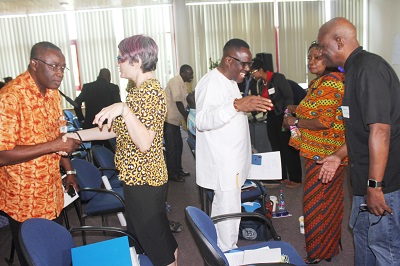
A two-day summit on labour has commenced in Accra to intensify advocacy on better conditions of service for black workers across the world.
It was organised by the United States of America (USA)-based civil and workers rights organisations, National Association for the Advancement of Coloured People (NAACP), Coalition of Black Trade Unionists (CBTU) and Solidarity Center (AFL-CIO), in collaboration with the Trade Union Congress (TUC), Ghana.
The event which formed part of activities to commemorate ‘The Year of Return’, would examine past labour practices and how it has changed over the years for the broader African diaspora and its current global impacts.
While discussing the rule of law, the key issues under consideration are global supply chain’s impact on labour, migration and the impact on workers, equality and inclusion and future of work for the African diaspora.
President of CBTU, Terry Melvin, opening the summit yesterday, said, economic concerns, have over the past 400 years, fuelled slavery and migration of Africans to take up works with arduous and sometimes dangerous conditions.
Although laws have been enacted to fight against slavery and assist victims of the act, he said, forced labour existed both in developed and developing nations.
To fully eradicate the problem of forced labour, he urged governments to evaluate reasons that gave rise to forced labour and identify the most useful policies to control it.
“When you look at the continent and even within the African diaspora, we see forced labour in sweatshop, manufacturing, agricultural jobs and domestic work.
In Africa and the USA, we see workers living on farms where they are dependent on the owner, which is similar to slavery,” he added.
Other features of today’s forced labour, Mr Melvin said, include violence and harassment against women at the workplace and division of workers by gender, age, sexual orientation, language and ethnic group as well as poor remuneration and conditions of service.
He said such negative developments in the world of work required collaboration among labour unions to fight back and change the trend.
Josuah Ansah, Deputy Secretary General of TUC Ghana, noted that, contrary to popular belief that slavery has been abolished, a 2018 Global Slavery Index estimated that 9.2 million Africans live in slavery under various conditions including armed conflicts, forced labour and forced marriages.
“Today, we still have some employers who treat their employees as slaves. We still have some employers who prevent their employees from joining trade unions. In many workplaces, there is open discrimination in employment, long working hours, poor health and safety standards and total absence of workers’ participation in decision-making processes,” he stated.
As labour unions, he said, it was time they shared information and experiences to help ensure that workers irrespective of their place or sector, worked under safe conditions.
BY CLAUDE NYARKO ADAMS







